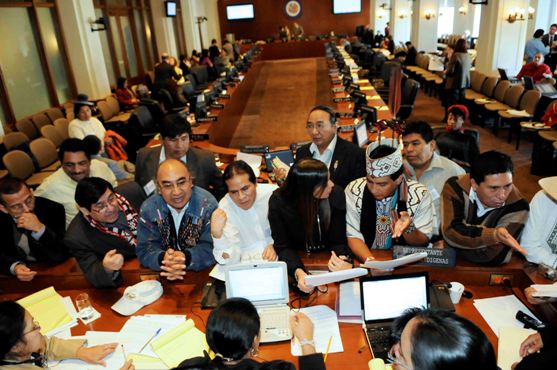Indigenous leaders from 29 countries met in Washington, D.C. in early December seeking consensus on a proposed legal framework to protect economic, cultural and political rights. The meetings were hosted by the Organization of American States, a regional organization which seeks to build peace, solidarity and collaboration among countries.
|
|
"This work needs to be completed," said Armstrong Wiggins, director of the Indian Law Resource Center's Washington, D.C. office. "The American Declaration is not yet adopted, and I fear it could become an orphan if countries do not act more seriously on it."
The dialogue over the American Declaration comes as global initiatives are threatening indigenous rights. The World Bank and United Nations have funded several projects that are designed to provide climate change solutions but instead could harm indigenous communities if developed on their lands and territories. These projects could lead to violations of indigenous peoples' land and natural resource rights. The American Declaration would address these threats and establish a framework to protect indigenous rights from potential violations.
"We should not wait for human rights violations to occur in areas impacted by these global projects," Wiggins said. "Instead, we should take a proactive role, under the umbrella of the American Declaration, to advise funding institutions about potential human rights violations and give guidance on how best to work with indigenous communities."
Despite the fact that no consensus has yet been reached, progress has been made. Most recently, consensus was reached on four important articles in the draft Declaration (Article VIII Right To Belong To The Indigenous Peoples; Article XIII Systems Of Knowledge, Language And Communication; Article XIV Education; and Article XXXV, a general provision related to conflicts with indigenous peoples) and the first paragraphs of Article VI (Collective Rights) and Article XVI (Indigenous Family). Unfortunately, as in the past, the United States refused to participate in a meaningful way in this process.
During the most recent OAS negotiation session, the Center coordinated meetings between the Navajo Nation, the Six Nations Confederacy, the National Congress of American Indians, the Native American Rights Fund and the U.S. State Department. The meetings were to encourage the U.S. State Department to take a more active leadership role in the negotiations.
The Center, along with our partners, will continue to seek meetings with the State Department and key members of the Obama Administration to gain stronger support.
| MORE |
____________________________________________________________
Opening Statement by the Caucus
Statement by the US Delegation
Record of the current status of the Declaration

